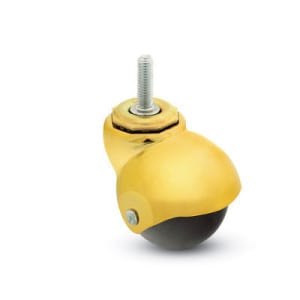 You may think it is impossible to make a mistake when you order casters. After all, a caster is a caster is a caster, right?
You may think it is impossible to make a mistake when you order casters. After all, a caster is a caster is a caster, right?
Wrong! There’s your first mistake. Casters come in all shapes, sizes and configurations, and the most common error people make when ordering casters is that they don’t fully understand all the options that are available tothem. Because of this they don’t make the right choice.
This article should help you avoid some very common pitfalls when it comes to purchasing casters.
First, a Little Information About Shepherd Casters
Here at Douglas Equipment it always makes us proud to be able to offer our customers items from the best manufacturers in the business, and it’s certainly tough to think of any company better than Shepherd when it comes to casters. Founded by George Shepherd in 1945, Shepherd has been manufacturing the best casters that money can buy for over 45 years now. They have a huge portfolio of casters for all types of applications, and we are able to supply you with their entire product line of casters.
It’s hard to understand how people can go wrong when ordering Shepherd Casters, but sadly mistakes are still made. Here are a few of the most common ones:
1. People Underestimate the Loads That Their Casters are Expected to Bear
Casters are tough. That’s for certain. Because they are small and constructed to bear sizable loads, even the most humble caster can deal with loads and weights that other types of wheels might baulk at. Casters are designed to bear weight and roll smoothly – they are not built for speed.
However, different types of casters are capable of bearing different weight capacities, and it’s important that your casters are capable of bearing the weight you are intending for them to bear. If you underestimate loads, then your casters will fail. This is dangerous. A broken caster may cause the items they are transporting to tilt or fall, resulting indamage to the item or even injury to the person transporting it.
In general, for medium-grade loads we recommend Shepherd’s General Duty series. These come in two varieties – one with a swivel top plate, and one with a rigid top plate. If maneuverability is key, then you should go for the swivel plate model. These tight little models are suitable for material handling, institutional equipment, industrial equipment, and for simple furniture applications. They come in a range of different types with dynamic load capacities between 80 and 120 lbs.
2. People Don’t Consider the Type of Floors They’ll Be Using Their Casters On
The next time you go to any facility where casters are in regular use, take a look at the floor. Is it clean and sparkling, or is it scuffed by dozens of faint black lines? If it’s the latter, then the people in charge may have made mistakes in purchasing the correct type of caster!
Casters can mark floors – that’s certainly true. Some casters are made to be used in production facilities where the floor is typically concrete or littered with debris. It doesn’t really matter if the floor gets streaked in such facilities.
However, in any environment where it’s important to have non-marking casters.
For the ultimate in non-marking casters, we recommend the Glass Handling series from Shepherd. These casters are designed for use with applications where glass is handled, but their non-marking abilities are so exceptional that they can be used anywhere. They have soft, non-marking neoprene rubber wheels that get the job done without ruining your floors, and they have a maximum single load capacity of 75 lbs.
3. People Choose Fixed Casters Over Swivel Casters
You might ask yourself what’s the difference between a fixed caster and a swivel caster? Even if you understand the difference you might ask yourself is the difference really that important? The answer is yes!
Swivel casters and fixed casters behave very differently. Imagine you are in your car approaching a tight bend. If you have wheels that swivel then you will make that bend very easily. If you have wheels that are fixed then you would be unlikely to make the bend at all. The same goes for casters. If you need to maneuver your caster-mounted items easily, then opting for fixed casters is the very worst thing you can do.
For exceptional swivel casters we recommend any of the Bassick series from Shepherd Casters. There are a number of casters in this range, including the Diamond and Honcho series. Most of these casters come with a superb swivel assembly that you can truly rely on for ease of movement. They are expressly designed for use with platform trucks, warehouse trucks and material handling containers. You also have a huge amount of choices when it comes to these casters – wheel types, mounting types … you can also design a custom-made caster that’s fully suited to your needs. The range of loads this caster is capable of carrying stretches from 600 – 1250 lbs. – no matter your needs, the Bassick series has a caster that’s bound to suit.
4. They Don’t Order from Douglas Equipment!
Here at Douglas Equipment, our goal is to help you make the perfect caster purchase that’s right for your business needs. To make sure you avoid some of the common pitfalls mentioned above, contact one of our expert sales staff members who will be more than happy to point you in the right direction.
Contact us at 1-800-451-0030 or by using the online contact form today!




